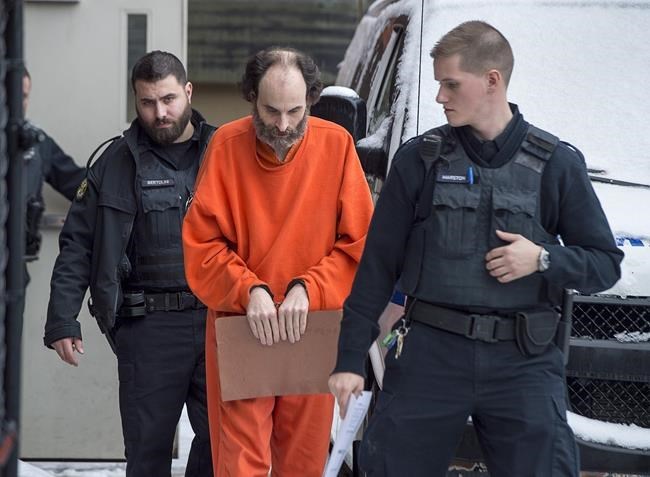
Matthew Vincent Raymond is escorted from provincial court in Fredericton on Friday, Feb. 8, 2019. THE CANADIAN PRESS/Andrew Vaughan
November 20, 2020 - 9:30 AM
Here's a look at some high-profile Canadian cases in which there was a not criminally responsible finding:
Matthew Raymond
Raymond shot and killed four people — two civilians and two police officers — from the window of his Fredericton apartment on Aug. 10, 2018. At his trial, the Crown and defence agreed Raymond suffered from a mental disorder. Evidence was presented that on the day of the shooting he believed the end of times had arrived and he was surrounded by demons. One psychiatrist testified that Raymond suffered from schizophrenia while another said it was a delusional disorder. Crown prosecutors argued Raymond's delusions were not intense enough to prevent him from understanding that he was shooting humans, and that it was wrong. A jury found Raymond not criminally responsible on Friday.
___
Rohinie Bisesar
Bisesar fatally stabbed Rosemary Junor, a complete stranger, in a pharmacy in downtown Toronto on Dec. 11, 2015. In 2018, a judge found that Bisesar was in the throes of psychotic episode due to untreated schizophrenia at the time of the attack. A psychiatrist concluded Bisesar suffered from severe hallucinations and delusions that manifested as a voice commanding her to harm someone. Earlier this year, the Ontario Review Board – which manages the cases of those found not criminally responsible and decides what level of supervision they need – gave the director of the mental health hospital where Bisesar lives the discretion to allow her to live in supervised accommodation in the community.
___
Matthew de Grood
De Grood was found not criminally responsible for the killings in April 2014 of Zackariah Rathwell, Jordan Segura, Kaitlin Perras, Josh Hunter and Lawrence Hong in Calgary. It was ruled that he was suffering delusions at the time and did not understand his actions were wrong. The university student, who has schizophrenia, went to a party that marked the end of the school year believing the devil was talking to him and a war was about to begin, signalling the end of the world. A provincial mental health review board said last month that de Grood is making progress as a patient at Alberta Hospital Edmonton, but will not be allowed to go into a group home in the next year. The board also rejected recommendations to allow de Grood travel of up to one week within Alberta and unsupervised passes in Edmonton. His lawyers are appealing the review board's decision.
___
Vincent Li
Li fatally stabbed and beheaded Tim McLean, the young man sleeping next to him on a Greyhound bus in Manitoba, on July 30, 2008. Li told a mental-health advocate he heard the voice of God telling him McLean was an alien who he needed to destroy. Li was found not criminally responsible and was sent to the Selkirk Mental Health Centre. Li saw his privileges expand slowly after his admission to the facility. In February 2016, Li, now known as Will Baker, won the right to eventually move out of a group home and live on his own. In 2017, he was granted an absolute discharge after the board found he did not pose a significant safety threat.
___
Richard Kachkar
Kachkar stole a snow plow in the early morning of Jan. 12, 2011 and, in the middle of a two-hour rampage with it, hit and killed Toronto police Sgt. Ryan Russell. Witnesses heard him yell about the Taliban, Chinese technology and microchips. He was found not criminally responsible at trial in 2013 and was held in the secure unit of a mental health hospital near Toronto. In 2018, the Ontario Review Board gave Kachkar a conditional discharge.
___
Allan Schoenborn
Schoenborn killed his three children, ages 10, eight and five, in Merritt, B.C., in April 2008. He was diagnosed with delusional disorder and said he killed the children to protect them from an imagined threat of sexual abuse. He was found not criminally responsible at trial in 2010 and has been living at a psychiatric hospital in Coquitlam, B.C. In March 2020, the British Columbia Review Board gave the director of the hospital the discretion to allow unescorted outings in the community for Schoenborn. A lawyer for Schoenborn told a review board hearing that the director's decision to grant access would be based on any future progress made by his client in treatment.
___
This report by The Canadian Press was first published Nov. 12, 2020.
News from © The Canadian Press, 2020